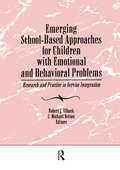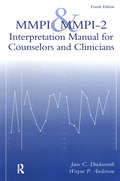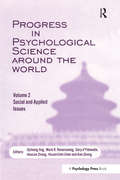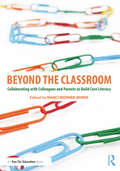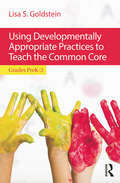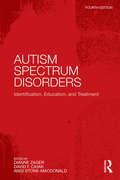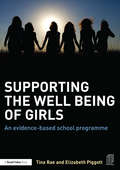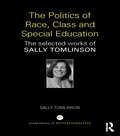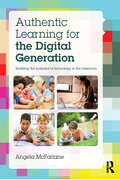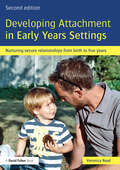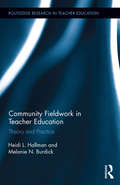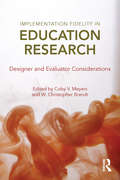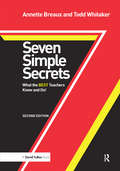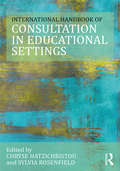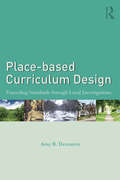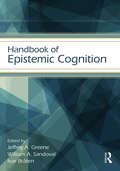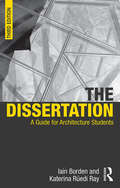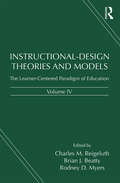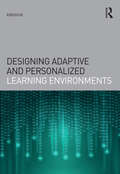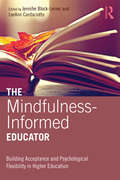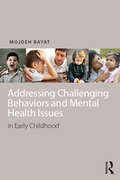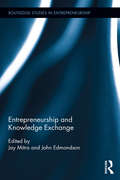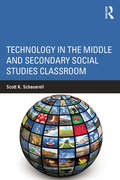- Table View
- List View
Emerging School-Based Approaches for Children With Emotional and Behavioral Problems: Research and Practice in Service Integration
by C Michael Nelson Robert J IllbackIt is becoming recognized that the multiple and complex problems of children with emotional and behavioral problems and their families exceed the capacity of any single service system. Emerging School-Based Approaches for Children With Emotional and Behavioral Problems presents educators and social service practitioners with innovative programs and practices for these children while in school with emphasis on inter-service collaboration. The book fulfills a growing need for an organized discussion of how the integrated service paradigm can be applied in the context of school settings. Special consideration is given to the issues and problems that are idiosyncratic to schools as institutions. Emerging School-Based Approaches for Children With Emotional and Behavioral Problems shows school administrators, teachers, and child service providers conceptual, practice, and research aspects of integrated service programs in school settings. Professionals gain insight for planning organizational change as prominent experts and practitioners share their work across a range of issues and geographic sites. They explore these topics: systems of care for children and families schools as health delivery sites parent involvement for students with emotional and behavioral disorders program planning and evaluation planned organizational changeChapters provide readers with general information about the features of an integrated approach, provide practical examples of exemplary programs, and consider organizational change issues that can facilitate or impede movement toward a more collaborative approach. Programs presented focus on the development of more broad-based community services, less restrictive child placement, prevention of hospitalization and out-of-home placement, interagency collaboration, flexible and individualized services, and cost containment and efficiency. The integrated service movement in children’s services holds much promise as a means to create more comprehensive and coordinated school-based systems of care for children and families. Special education teachers and administrators, school and child clinical psychologists, and school counselors will find Emerging School-Based Approaches for Children With Emotional and Behavioral Problems fundamental to their understanding of the integrated systems approach and a helpful guide as they undergo their own organizational changes.
MMPI And MMPI-2: Interpretation Manual For Counselors And Clinicians
by Jane C. Duckworth Wayne P. AndersonFirst published in 1995. Routledge is an imprint of Taylor & Francis, an informa company.
Progress in Psychological Science Around the World. Volume 2: Proceedings of the 28th International Congress of Psychology
by Qicheng Jing, Mark R. Rosenzweig, Géry d’Ydewalle, Houcan Zhang, Hsuan-Chih Che, and Kan ZhangProgress in Psychological Science around the World, Volumes 1 and 2, present the main contributions from the 28th International Congress of Psychology, held in Beijing in 2004. These expert contributions include the Nobel laureate address, the Presidential address, and the Keynote and State-of-the-Art lectures. They are written by international leaders in psychology from 25 countries and regions around the world. The authors present a variety of approaches and perspectives that reflect cutting-edge advances in psychological science. This second volume builds on the coverage of neural, cognitive, and developmental issues from the first volume, to address social and applied issues in modern psychology. The topics covered include: educational psychology and measurement, health psychology, and social and cultural psychology. Organizational, applied, and international psychology are also discussed. Progress in Psychological Science around the World, with its broad coverage of psychological research and practice, and its highly select group of world renowned authors, will be invaluable for researchers, professionals, teachers, and students in the field of psychology.
Beyond the Classroom: Collaborating with Colleagues and Parents to Build Core Literacy
by Nanci Werner-BurkeGo beyond the walls of your classroom to build literacy and achievement. In this insightful book, you’ll discover how you can better meet the rigorous goals of the Common Core by opening new lines of communication with colleagues, parents, and students. Each chapter centers around an action project that was designed to help teachers improve literacy by moving beyond the typical class lessons and worksheets. The projects include... A book club for families of kindergarten and first grade students, to help students build foundational literacy skills A book club designed to engage middle school students with young adult literature using digital forums "Write with your child" evenings to help parents connect with their middle school children An instructional team’s challenge to use a range of mentor texts in their classrooms And much more! As you read each project, you’ll come away with ideas and inspiration that you can apply to your own teaching. By challenging yourself to connect with parents and colleagues on a deeper level, you will be better able to align your work, adjust for your students, and achieve your teaching goals.
Using Developmentally Appropriate Practices to Teach the Common Core: Grades PreK–3
by Lisa S. GoldsteinUsing Developmentally Appropriate Practices to Teach the Common Core: Grades PreK–3 provides current and prospective primary grade teachers with an understanding of the CCSS-ELA and CCSS-M that highlights their compatibility with developmentally appropriate practices (DAP), the instructional approach generally preferred by teachers of young children. The book begins by framing the CCSS as a distinct improvement over lengthy lists of academic content standards and as a carefully conceptualized and DAP-friendly set of curriculum guidelines. Next, the CCSS-ELA and CCSS-M for Grades K–3 are unpacked, analyzed, synthesized, and cross-referenced to key features of DAP. Finally, several "hot topic" issues—differentiating instruction to meet the needs of all learners, ensuring equitable access to the curriculum for English Language Learners, addressing assessment and accountability expectations, and educating parents and families about the CCSS and DAP—are prioritized and examined in depth. Using Developmentally Appropriate Practices to Teach the Common Core: Grades PreK–3 is a highly useful guide for both pre-service and in-service early childhood education teachers.
Autism Spectrum Disorders: Identification, Education, and Treatment
by Angi Stone-Macdonald David F. Cihak Dianne ZagerThe field of autism has been growing at an unprecedented rate in recent years. In addition to an actual rise in the number of classic DSM-IV cases, broadened diagnostic criteria have uncovered a wider range of autistic behaviors and ability levels. The third edition of this well-known text continues the mission of its predecessors--to present a comprehensive, readable, up-to-date overview of the field of autism, one that links research, theory, and practice in ways that are accessible to both practitioners and parents. Key features include:*Expanded Coverage--To accommodate the recent explosion of research, the book has been expanded from 11 to 14 chapters that examine the impact of autism on the individual and the family from infancy through adulthood.*Expertise--Internationally recognized experts offer cutting-edge treatment and educational information on topics such as early diagnosis, medical treatment, assessment, educational methods, language development, behavior regulation, and family support.*Neurobiological Research--Comprehensive medical research and treatment chapters provide an understandable overview of neurobiological research and current treatments including when and how medication can be employed as part of a treatment plan.*Focus on Early Years--Old sections I and III have been combined and a new 3-chapter section on early identification and intervention added.*Focus on Parents and Families--In addition to a chapter on the evolving role of families, a new chapter addresses family needs during the preschool years.*Integration of Assessment and Intervention--The chapters on assessment and intervention have been reorganized and more closely integrated in keeping with current thinking about their inter-relatedness.*Future Directions--Two chapters discuss emerging directions in this exploding field and how to make informed decisions among a variety of approaches.This book is appropriate for anyone--students, practitioners, or parents--who must provide care for an autistic child.
Supporting the Well Being of Girls: An evidence-based school programme
by Tina Rae Elizabeth PiggottSupporting the Well being of Girls will provide teachers, psychologists, youth workers and learning mentors with an evidence based approach to the vitally important task of supporting and maintaining the well being of girls. This tried and tested programme offers teachers in upper primary and secondary schools sixteen tailored, expert sessions which engage girls and young women in tackling and addressing some of their key concerns and issues. Written by hugely experienced educational psychologists, the sessions utilise tools and strategies from a range of therapeutic interventions including cognitive behavioural therapy and positive psychology to provide a safe and nurturing environment in which to consider some sensitive issues and ultimately providing young women with the strength and self awareness to maintain overall well-being. Areas covered include:- • Body image and appearance• Bullying• Mental health, anxiety and depression• Relationships• Stereotypes• Self-harm• Stress• Healthy Living Throughout, clear guidance is offered to teachers on running sessions including, welcome and ground rules, talk time and inviting students to share experiences, ice-breakers, activities and feedback. This programme of support also includes a full range of support tools for the school including:- • Information sheet for students• Information sheet for parents• Letter to parents• Mental health fact sheet• Referral routes to specialist agencies• Mental health agencies – contact details• Policy for schools on developing mental health work
The Politics of Race, Class and Special Education: The selected works of Sally Tomlinson
by Sally TomlinsonIn the World Library of Educationalists series, international experts themselves compile career-long collections of what they judge to be their finest pieces – extracts from books, key articles, salient research findings, major theoretical and practical contributions – so the world can read them in a single manageable volume. Readers will be able to follow the themes and strands and see how their work contributes to the development of the field. Professor Sally Tomlinson brings together 12 of her key writings in one place, including chapters from her best-selling books and articles from leading journals. In this landmark publication she reviews and recounts the history and development of her research and writing over 30 years that is concerned with the politics of education systems, especially special education, and the place of social classes and ethnic and racial minorities in the systems. Social class, race and gender have historically always been essential markers in deciding who would receive a minimum or inferior education and thus fail to obtain whatever were currently acceptable qualifications. Definitions of the ‘less able’ or ineducable were based on beliefs in the biological and cultural inferiority of lower social classes, racial and immigrant groups. Professor Tomlinson’s aim in her work has always been to introduce sociological, historical and political perspectives into an area dominated by psychological, administrative and technical views and to explain how the individual ‘problems’ were connected to wider social structures and policies. This unique collection illustrates the development of Professor Tomlinson’s thinking over the course of her long and esteemed career.
Authentic Learning for the Digital Generation: Realising the potential of technology in the classroom
by Angela McFarlaneWhy should we use technology to support learning? Where does the responsibility lie to prepare young people to be active and successful cybercitizens? Can we go on confiscating pupils’ smartphones indefinitely? Authentic Learning for the Digital Generation is a vital examination of young people’s use of personal devices, online creative communities and digital gaming. It calls into question the idea of the ‘digital native’ and shows clearly that the majority of young users need help and support in order to benefit from the rich learning potential of personal, mobile and online technology use. Written by a leading authority on the role of digital technologies in education, it looks in detail at the practice and implications of learning using personal devices, collaborative online spaces, learning platforms, user generated content and digital games. In particular, approaches to solving problems, building knowledge, manipulating data and creating texts are examined. It offers clear strategies, a vision for what effects on learning we might reasonably expect when children are given access to different types of technology, and explores the challenges of managing these practices in the classroom. Authentic Learning for the Digital Generation offers careful analysis at a time when there is much discussion about young people emerging from school unprepared for the world of work and often struggling to manage their personal relationships as they are exposed to strong content and harsh criticism online. It considers what we know of childhood experience in a digital world and offers ways in which schools and teachers can embrace the opportunity presented by ubiquitous ownership of connected, digital devices to enrich and deepen learning.
Developing Attachment in Early Years Settings: Nurturing secure relationships from birth to five years
by Veronica ReadProviding an accessible introduction to attachment thinking, this practical book offers early years practitioners’ advice on translating attachment principles into practice in their settings. It clearly explains how knowledge about attachment theory underpins everyday practice and highlights the crucial role of secure attachments in young children’s learning and development. Developing Attachments in Early Years Settings examines the importance of emotional‚ ‘holding’ and the nurturing of individual relationships within group childcare. The book aims to help you make a real difference to young children’s sense of self and emotional security by being ‘tuned in’, available, responsive and consistent. With a strong focus on facilitating secure attachments from the beginning and guidance on how to observe young children effectively, this new edition has been thoroughly updated and revised to include: How to make a positive contribution to good practice for Government funded 2 year olds A new chapter on the Emotional Environment and the Developing Brain Expansion of material on the importance of the outdoors, as well as Nurture group practice Additional material about working in partnership with parents and developing positive relationships Each chapter includes a personal reflection exercise and a positive contribution to good practice section. With its accessible approach, this book is essential reading for both practitioners and students looking for guidance on how to nurture secondary attachment relationships in group care settings.
Community Fieldwork in Teacher Education: Theory and Practice (Routledge Research in Teacher Education)
by Heidi L Hallman Melanie BurdickIn teacher education, field work in community-based spaces (including foster homes and programs for homeless youth) is frequently contrasted with "traditional" field experiences in classroom settings, where beginning teachers are immediately introduced to teacher-centered models of instruction. This volume works against such a model, presenting a counter-narrative of new teachers’ understanding of the act of teaching. By exploring their work with at risk youth in community-based sites, the authors uncover how non-traditional spaces for teaching and learning have the potential to open new doors for reimagining the teaching act and teacher identity. This volume examines how prospective teachers have used writing within unconventional spaces as catalysts for considering what it means to become a teacher, as well as how the work of teaching can be conceptualized. It unites the practical aspects of field work and with theoretical conceptions of teaching, and envisions how the work and the definition of "teaching" can be broadened.
Implementation Fidelity in Education Research: Designer and Evaluator Considerations
by Coby Meyers W. Christopher BrandtImplementation science is an important and underrepresented topic in the literature of educational research, despite the fact that it is inextricably tied to education policy and improvement. Implementation fidelity (the degree to which a program or intervention is delivered as planned) is, in particular, a key issue for every program developer and researcher designing, executing, interpreting, or communicating their work. Implementation Fidelity in Education Research provides the first serious developer-evaluator collaborative perspective on the practical considerations of implementation fidelity in program development. Using case studies from Investing in Innovation (i3) fund grants, this book prepares future researchers for the challenges posed by implementation issues both ideologically and in practice. This book will be an excellent resource for anyone interested in education research and evaluation and an excellent supplement to research methods courses.
Seven Simple Secrets: What the BEST Teachers Know and Do!
by Annette Breaux Todd WhitakerWant to know a secret? Regardless of what classroom challenges, standards or initiatives you're faced with from year to year, there are seven keys to great teaching that never change--and that are often overlooked! In this bestselling book, internationally-acclaimed authors Annette Breaux and Todd Whitaker reveal the seven simple secrets of effective teaching that can be applied in any classroom. Whether you're a new or experienced teacher, you'll gain valuable insights on improving instruction, classroom management, discipline, student motivation, and much, much more! This updated Second Edition contains timely topics such as incorporating technology to enhance your lessons and using social media appropriately. Special Features: Easy-to-use format: The book is divided into seven secrets shared by highly effective teachers. Each secret is then divided into seven parts filled with practical information on why the secret matters and how to implement it effectively. Reflection questions: At the end of each section, there are seven questions to help you determine whether you have mastered each secret. Bonus lists: This special new section contains lists on the qualities of effective teaching and why these qualities matter. These lists can be copied and used during book studies, PLC meetings, or staff meetings to provoke thoughtful discussions and enhance teaching and learning. Study guide: A study guide is available to help you extend your learning independently or with colleagues. www.routledge.com/books/details/9781138783621 Companion website: For more inspiring, informative books from Todd and Annette, check out our special site, www.routledge.com/cw/breaux, going live this summer. Throughout the book, you'll find practical examples and heartfelt advice to encourage you as you implement the seven secrets. As you improve your teaching, you profoundly influence the lives of those who matter most--your students!
The International Handbook of Consultation in Educational Settings (Consultation, Supervision, and Professional Learning in School Psychology Series)
by Chryse Hatzichristou Sylvia RosenfieldThe rapid changes in the composition of school-age youth around the world have catalyzed a growing concern about how to address children’s mental health and education. Grounded in this increasingly global perspective, The International Handbook of Consultation in Educational Settings is designed to provide a multicultural/transnational approach to consultation theory, research, training, and practice in educational settings. With chapters written by geographically diverse and prominent scholars across the field of school psychology, this handbook captures the range of ways in which consultation services are trained, implemented, and researched internationally. Written for practitioners, researchers, faculty members, and graduate students in the fields of school psychology, school counseling, special education, and educational psychology, this volume is the first of its kind to provide a comprehensive look at consultation in learning environments across the world. The International Handbook of Consultation in Educational Settings offers various perspectives on models, implementation, training, and research on school consultation. After an introduction to the volume by the editors, contributors to Part II examine school-based consultation around the world to explore how consultation services are implemented in different countries. Part III addresses cross-cultural issues in consultation, particularly at a systems level. Part IV presents themes related to processes and issues in the implementation of consultation by focusing on approaches in various countries. The chapters in Part V focus on consultation training, offering insights into the development of students and professionals into effective consultants in cross-cultural and systemic contexts. Part VI describes how practitioners can contribute to the body of research on consultation through careful planning and implementation of their work. Finally, the editors summarize key concepts and findings in a concluding chapter.
Place-based Curriculum Design: Exceeding Standards through Local Investigations
by Amy B. DemarestPlace-based Curriculum Design provides pre-service and practicing teachers both the rationale and tools to create and integrate meaningful, place-based learning experiences for students. Practical, classroom-based curricular examples illustrate how teachers can engage the local and still be accountable to the existing demands of federal, state, and district mandates. Coverage includes connecting the curriculum to students’ outside-of-school lives; using local phenomena or issues to enhance students’ understanding of discipline-based questions; engaging in in-depth explorations of local issues and events to create cross-disciplinary learning experiences, and creating units or sustained learning experiences aimed at engendering social and environmental renewal. An on-line resource (www.routledge.com/9781138013469) provides supplementary materials, including curricular templates, tools for reflective practice, and additional materials for instructors and students.
Handbook of Epistemic Cognition (Educational Psychology Handbook)
by Jeffrey A. Greene, William A. Sandoval, and Ivar BråtenThe Handbook of Epistemic Cognition brings together leading work from across disciplines, to provide a comprehensive overview of an increasingly important topic: how people acquire, understand, justify, change, and use knowledge in formal and informal contexts. Research into inquiry, understanding, and discovery within academic disciplines has progressed from general models of conceptual change to a focus upon the learning trajectories that lead to expert-like conceptualizations, skills, and performance. Outside of academic domains, issues of who and what to believe, and how to integrate multiple sources of information into coherent and useful knowledge, have arisen as primary challenges of the 21st century. In six sections, scholars write within and across fields to focus and advance the role of epistemic cognition in education. With special attention to how researchers across disciplines can communicate and collaborate more effectively, this book will be an invaluable resource for anyone interested in the future of knowledge and knowing. Dr. Jeffrey A. Greene is an associate professor of Learning Sciences and Psychological Studies in the School of Education at the University of North Carolina at Chapel Hill. Dr. William A. Sandoval is a professor in the division of Urban Schooling at the UCLA Graduate School of Education & Information Studies. Dr. Ivar Bråten is a professor of Educational Psychology at the Faculty of Educational Sciences at the University of Oslo, Norway.
The Dissertation: A Guide for Architecture Students (Seriously Useful Guides Ser.)
by Iain Borden Katerina Ruedi RayThe Dissertation is one of the most demanding yet potentially most stimulating components of an architectural course. This classic text provides a complete guide to what to do, how to do it, when to do it, and what the major pitfalls are. This is a comprehensive guide to all that an architecture student might need to know about undertaking the dissertation. The book provides a plain guide through the whole process of starting, writing, preparing and submitting a dissertation with minimum stress and frustration. The third edition has been revised throughout to bring the text completely up-to-date for a new generation of students. Crucially, five new and complete dissertations demonstrate and exemplify all the advice and issues raised in the main text. These dissertations are on subjects from the UK, USA, Europe and Asia and offer remarkable insights into how to get it just right.
Autism and the Social World of Childhood: A sociocultural perspective on theory and practice
by Carmel ConnA key issue for researchers and practitioners is how to support the social engagement of children with autism in ordinary, everyday social processes that are transactional in nature and involve mixed groups of children, with and without autism, in rich and varied relationships. Autism and the Social World of Childhood brings together current understandings about the social engagement of children with autism, gained from psychology-based research into autism, with well-established ideas about children’s everyday social worlds, gained from sociocultural theories of childhood. It describes the experiences of interaction, friendship and play from children’s own point of view as a way of giving insight into children’s lives as they are lived and understood by them. Such an understanding serves to inform educational practice and aids the provision of more effective learning environments. Autism and the Social World of Childhood includes sections on: the nature of play, social interaction and friendship in autism the nature of children’s ordinary social worlds, including children’s cultures of communication and variation in children’s play research approaches to investigating the social engagement of children with and without autism in natural contexts educational approaches to supporting the integration of children with autism within a school setting the importance of assessment in autism education. Autism and the Social World of Childhood includes real life descriptions of children’s social experiences taken from ethnographic research into the play and interaction of children with and without autism. Practical guidance is provided on educational approaches to supporting the inclusion of children with autism within the ordinary social worlds of childhood.
Instructional-Design Theories and Models, Volume IV: The Learner-Centered Paradigm of Education
by Charles M. Reigeluth, Brian J. Beatty, and Rodney D. MyersInstructional-Design Theories and Models, Volume IV provides a research-based description of the current state of instructional theory for the learner-centered paradigm of education, as well as a clear indication of how different theories and models interrelate. Significant changes have occurred in learning and instructional theory since the publication of Volume III, including advances in brain-based learning, learning sciences, information technologies, internet-based communication, a concern for customizing the student experience to maximize effectiveness, and scaling instructional environments to maximize efficiency. In order to complement the themes of Volume I (commonality and complementarity among theories of instruction), Volume II (diversity of theories) and Volume III (building a common knowledge base), the theme of Volume IV is shifting the paradigm of instruction from teacher-centered to learner-centered and integrating design theories of instruction, assessment, and curriculum. Chapters in Volume IV are collected into three primary sections: a comprehensive view of the learner-centered paradigm of education and training, elaborations on parts of that view for a variety of K-12 and higher education settings, and theories that address ways to move toward the learner-centered paradigm within the teacher-centered paradigm. Instructional-Design Theories and Models, Volume IV is an essential book for anyone interested in exploring more powerful ways of fostering human learning and development and thinking creatively about ways to best meet the needs of learners in all kinds of learning contexts.
Instructional-Design Theories and Models, Volume IV: The Learner-Centered Paradigm of Education
by Charles M. Reigeluth, Brian J. Beatty, and Rodney D. MyersInstructional-Design Theories and Models, Volume IV provides a research-based description of the current state of instructional theory for the learner-centered paradigm of education, as well as a clear indication of how different theories and models interrelate. Significant changes have occurred in learning and instructional theory since the publication of Volume III, including advances in brain-based learning, learning sciences, information technologies, internet-based communication, a concern for customizing the student experience to maximize effectiveness, and scaling instructional environments to maximize efficiency.In order to complement the themes of Volume I (commonality and complementarity among theories of instruction), Volume II (diversity of theories) and Volume III (building a common knowledge base), the theme of Volume IV is shifting the paradigm of instruction from teacher-centered to learner-centered and integrating design theories of instruction, assessment, and curriculum. Chapters in Volume IV are collected into three primary sections: a comprehensive view of the learner-centered paradigm of education and training, elaborations on parts of that view for a variety of K-12 and higher education settings, and theories that address ways to move toward the learner-centered paradigm within the teacher-centered paradigm. Instructional-Design Theories and Models, Volume IV is an essential book for anyone interested in exploring more powerful ways of fostering human learning and development and thinking creatively about ways to best meet the needs of learners in all kinds of learning contexts.
Designing Adaptive and Personalized Learning Environments (Interdisciplinary Approaches to Educational Technology)
by KinshukDesigning Adaptive and Personalized Learning Environments provides a theoretically-based yet practical guide to systematic design processes for learning environments that provide automatic customization of learning and instruction. The book consists of four main sections: In "Introduction and Overview," the concepts of adaptivity and personalization are introduced and explored in detail. In "Theoretical Perspectives with Example Applications," various theoretical concepts underlying adaptive and personalized learning are discussed, including cognitive profiling, content-based adaptivity, exploration-based adaptivity, and mobile and ubiquitous settings. In "Practical Perspectives with Example Applications," the implementation process for adaptive and personalized learning environments is described, followed by application in various contexts. In "Validation and Future Trends," various evaluation techniques for validating the efficiency and efficacy of adaptive and personalized learning systems are discussed. This final section concludes with a discussion of emerging trends in adaptive and personalized learning research. Based on cutting-edge research, Designing Adaptive and Personalized Learning Environments is appropriate as a primary textbook for both undergraduate and graduate courses focused on the design of learning systems, and as a secondary textbook for a variety of courses in programs such as educational technology, instructional design, learning sciences, digital literacy, computer based systems, and STEM content fields.
The Mindfulness-Informed Educator: Building Acceptance and Psychological Flexibility in Higher Education
by Jennifer Block-Lerner LeeAnn CardaciottoThe Mindfulness-Informed Educator moves a growing body of evidence related to the efficacy of mindfulness- and acceptance-based approaches to the context of higher education, suggesting ways to foster psychological flexibility within and outside of the classroom. In the book, professionals across education and psychotherapy will find best practices for teaching, treating, researching, and serving their communities in ways that are sensitive to context, consistent with their values, and mindful of the diverse array of mental-health and behavioral difficulties experienced by college and university students. Chapters incorporate the most cutting-edge research across disciplines and span educational levels and contexts within higher education, provide strategies for strengthening mindfulness- and acceptance-based pedagogy and program development, and provide user-friendly supplemental materials such as transcripts and sample assignments.
Addressing Challenging Behaviors and Mental Health Issues in Early Childhood
by Mojdeh BayatA copublication with the Council for Exceptional Children (CEC), Addressing Challenging Behaviors and Mental Health Issues in Early Childhood focuses on research-based strategies for educators to address challenging behaviors of children during early childhood and elementary school years. Utilizing research from the fields of neuroscience, child development, child psychiatry, counselling and applied behavior analysis, the author suggests simple strategies for teachers to manage behaviors and promote mental health and resilience in children with challenging behaviors. Addressing Challenging Behaviors and Mental Health Issues in Early Childhood provides a framework for best practices which are empirically based and have been successfully utilized in the classroom. An appreciation of the deep understanding of culture as it affects curricular approaches, family engagement, and child growth and development is utilized throughout this comprehensive, multidisciplinary resource. Bayat references the most recent research in the field of child mental health and provides educational and intervention approaches that are appropriate for all children with and without disabilities.
Entrepreneurship and Knowledge Exchange (Routledge Studies in Entrepreneurship)
by Jay Mitra John EdmondsonOver the last several decades there has been a growing interest in the relationship between entrepreneurship and university-industry collaboration, namely how such cooperation can benefit entrepreneurship development at individual, national, and regional levels. While there are several refereed journal articles on different aspects of university-industry cooperation, most studies dwell primarily on instruments such as spin-offs, incubators and graduate entrepreneurs. This collection offers the first book-length compendium of international comparative perspectives on university-industry cooperation. Entrepreneurship and Knowledge Exchange explores insights from a wide variety of countries of relevance to researchers as well as policy and decision makers, especially those working in developing economies. Seminal contributions from top academics in the field, such as Alan Gibb, Peter Scott, and Mary Walshok, are included. The issues of knowledge transfer, entrepreneurship, and regional/national economic regeneration have inspired countless programs and initiatives at national and regional levels, and the chapters in this book examine these initiatives, providing both a reference work and a record of practical experience.
Technology in the Middle and Secondary Social Studies Classroom
by Scott ScheuerellTechnology in the Middle and Secondary Social Studies Classroom introduces pre-service teachers to the research underpinning the effective integration of technology into the social studies curriculum. Building off of established theoretical frameworks, veteran social studies teacher educator Scott Scheuerell shows how the implementation of key technologies in the classroom can help foster higher-level thinking among students. Plentiful, user-friendly examples illustrate how specific educational tools—including games, social media, flipped classrooms, and other emerging technologies—spur critical thinking and foster authentic intellectual work. A rigorous study, Technology in the Middle and Secondary Social Studies Classroom provides a comprehensive, up-to-date research framework for conceptualizing successful, technology-rich social studies classrooms.
